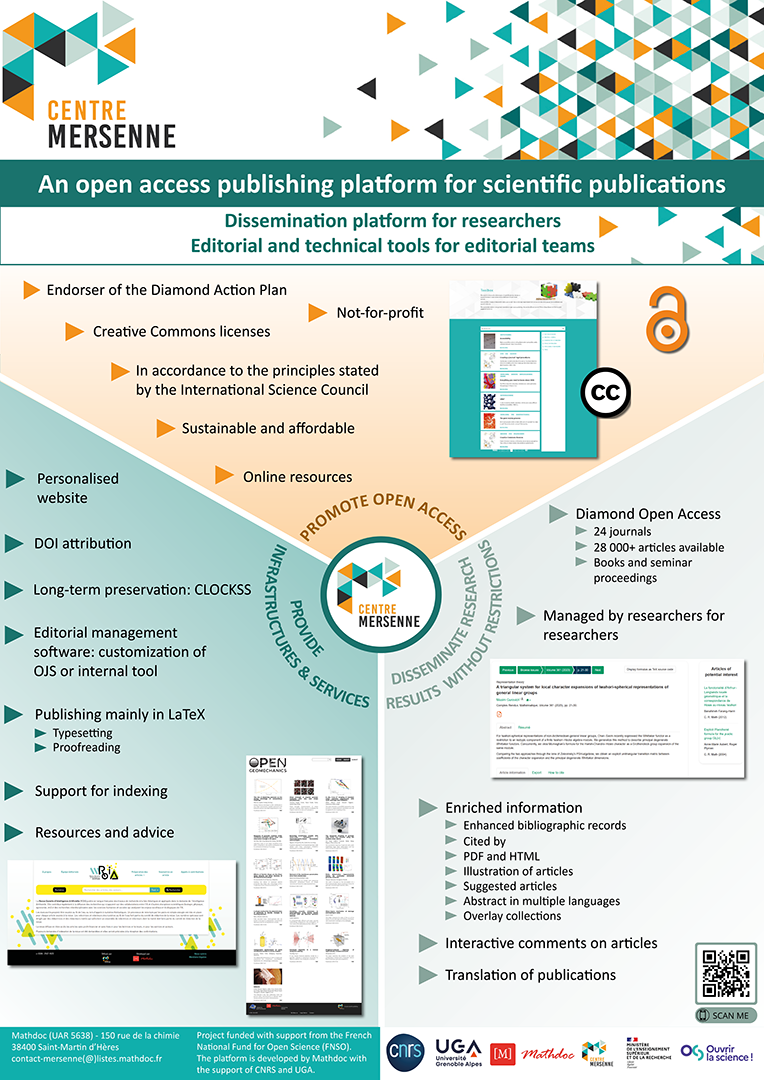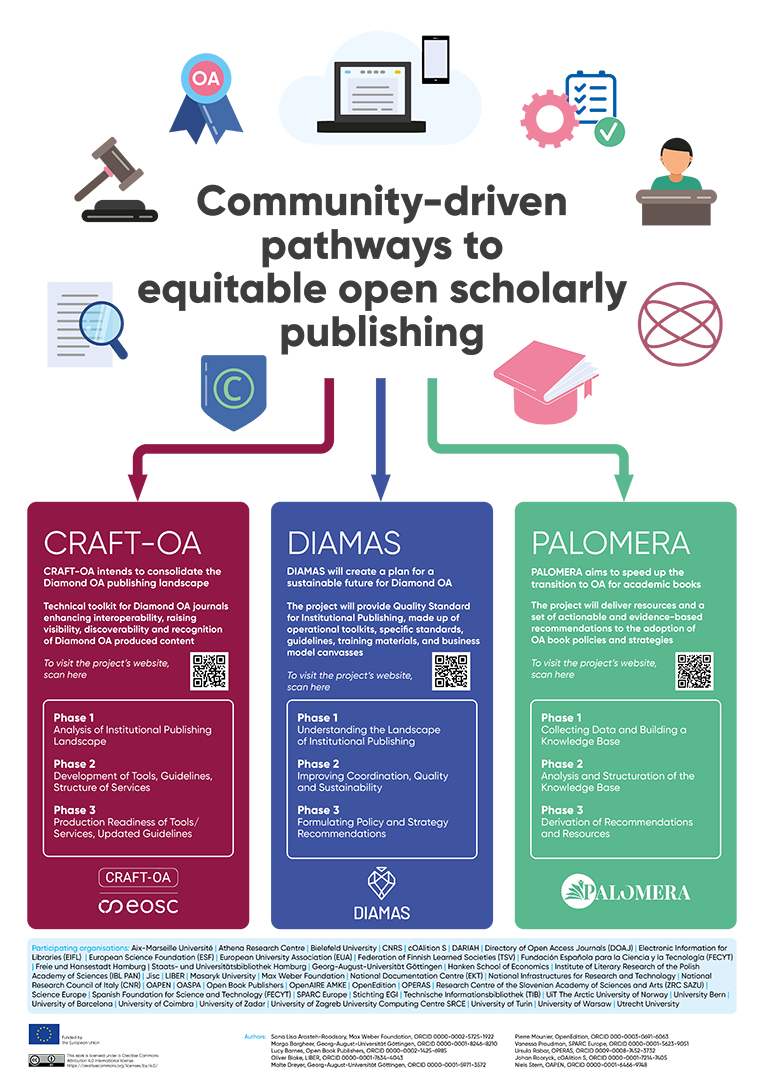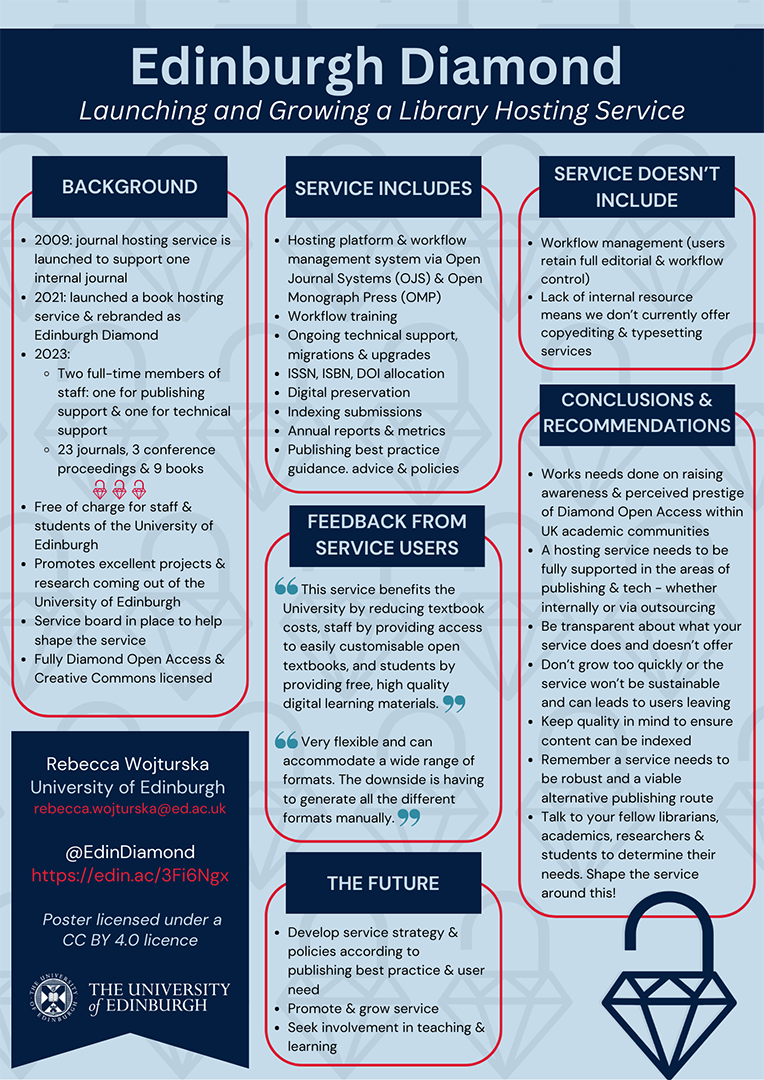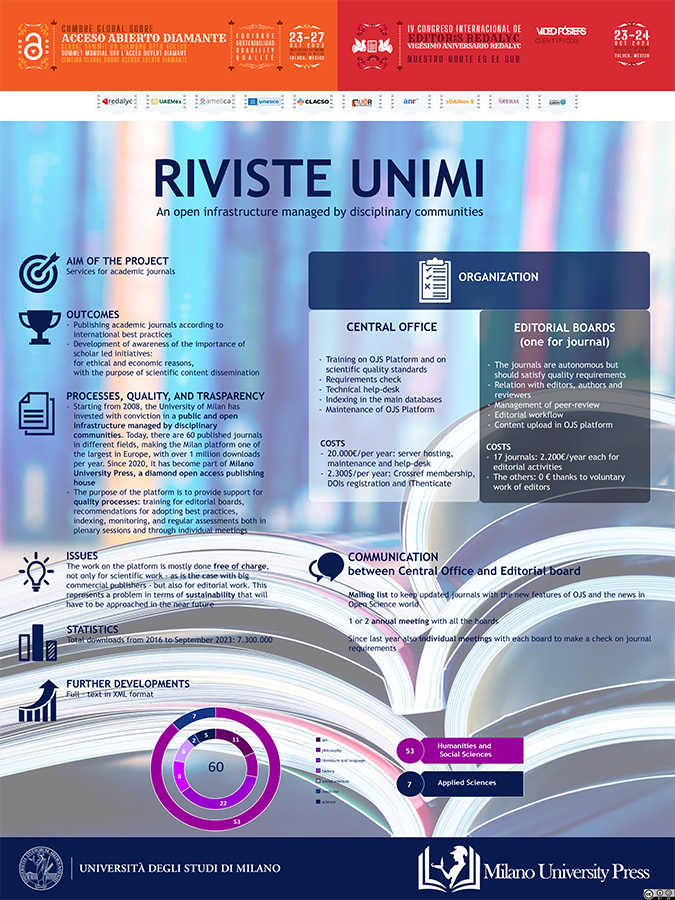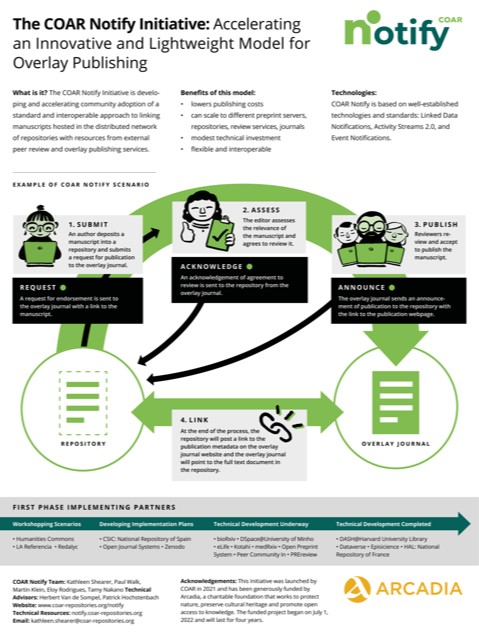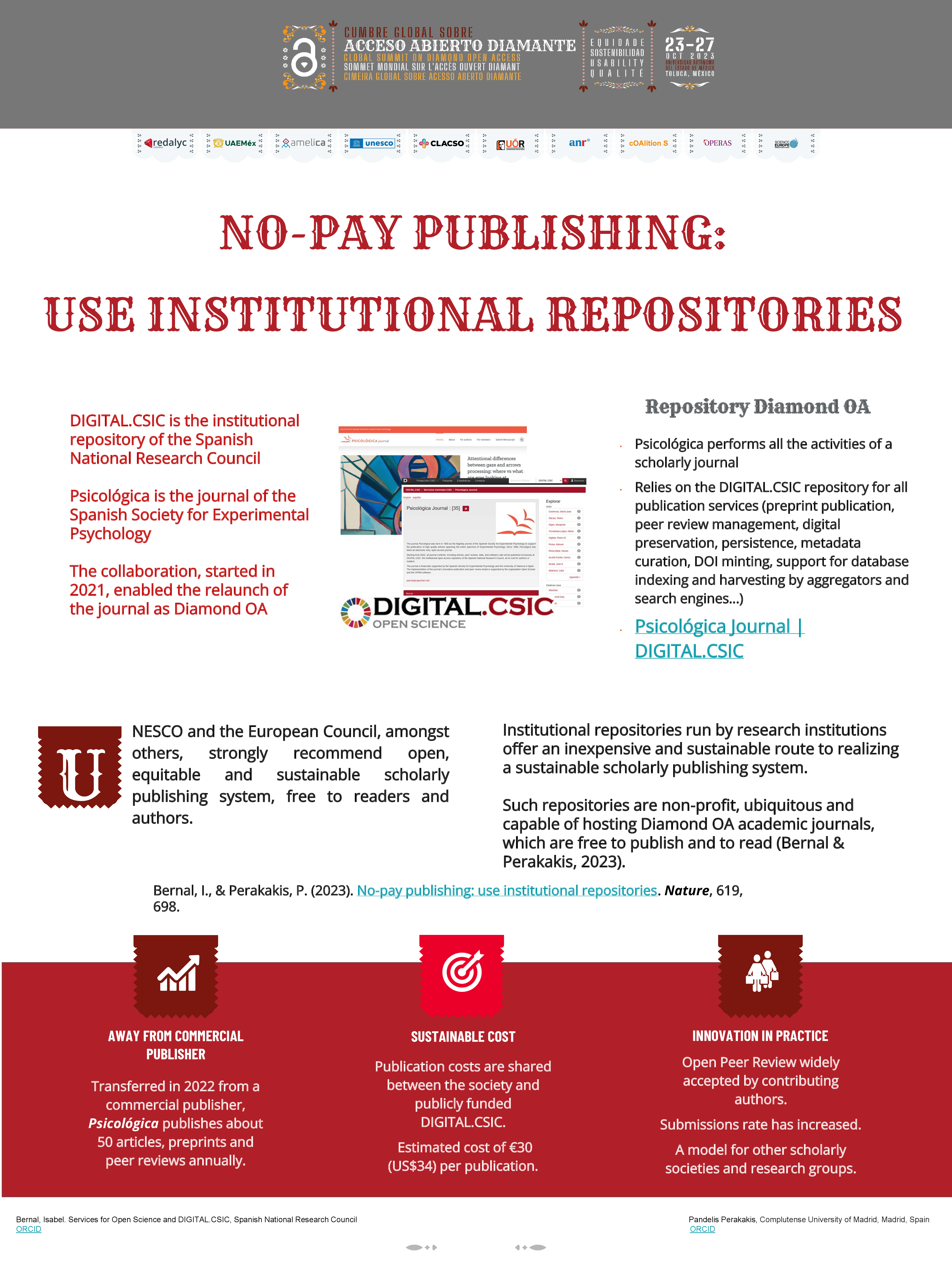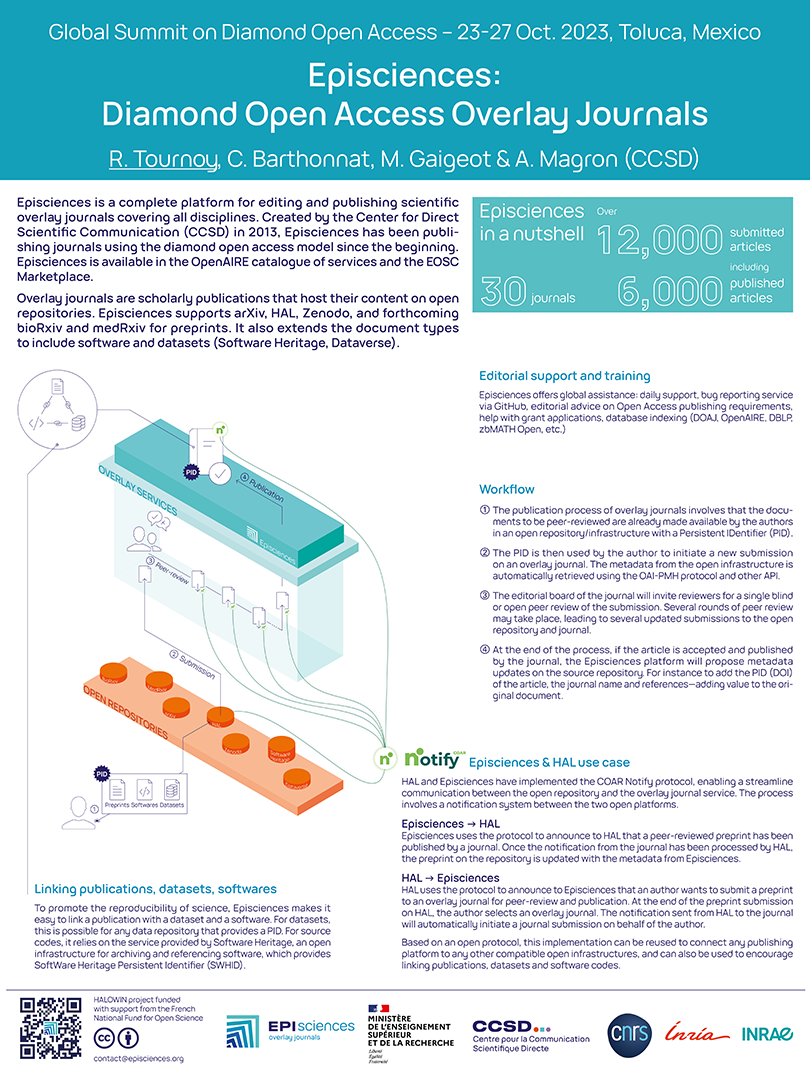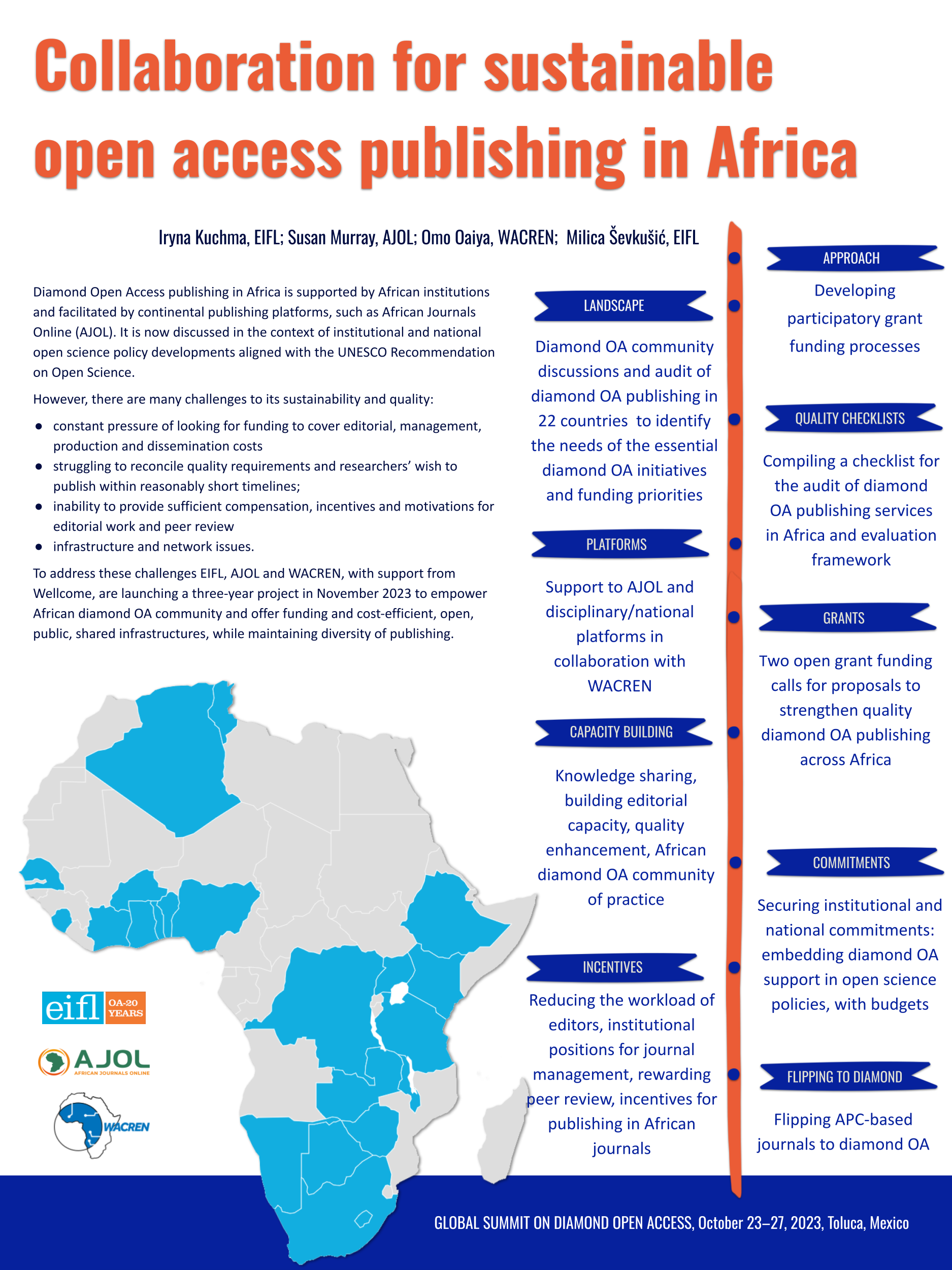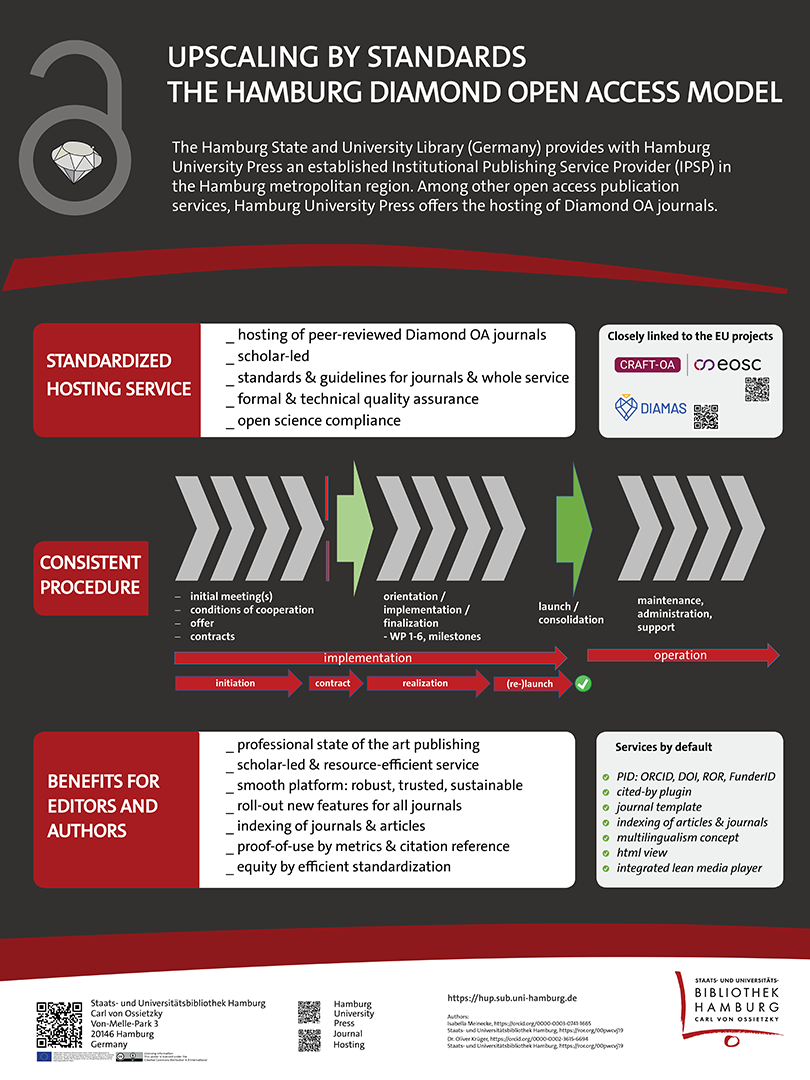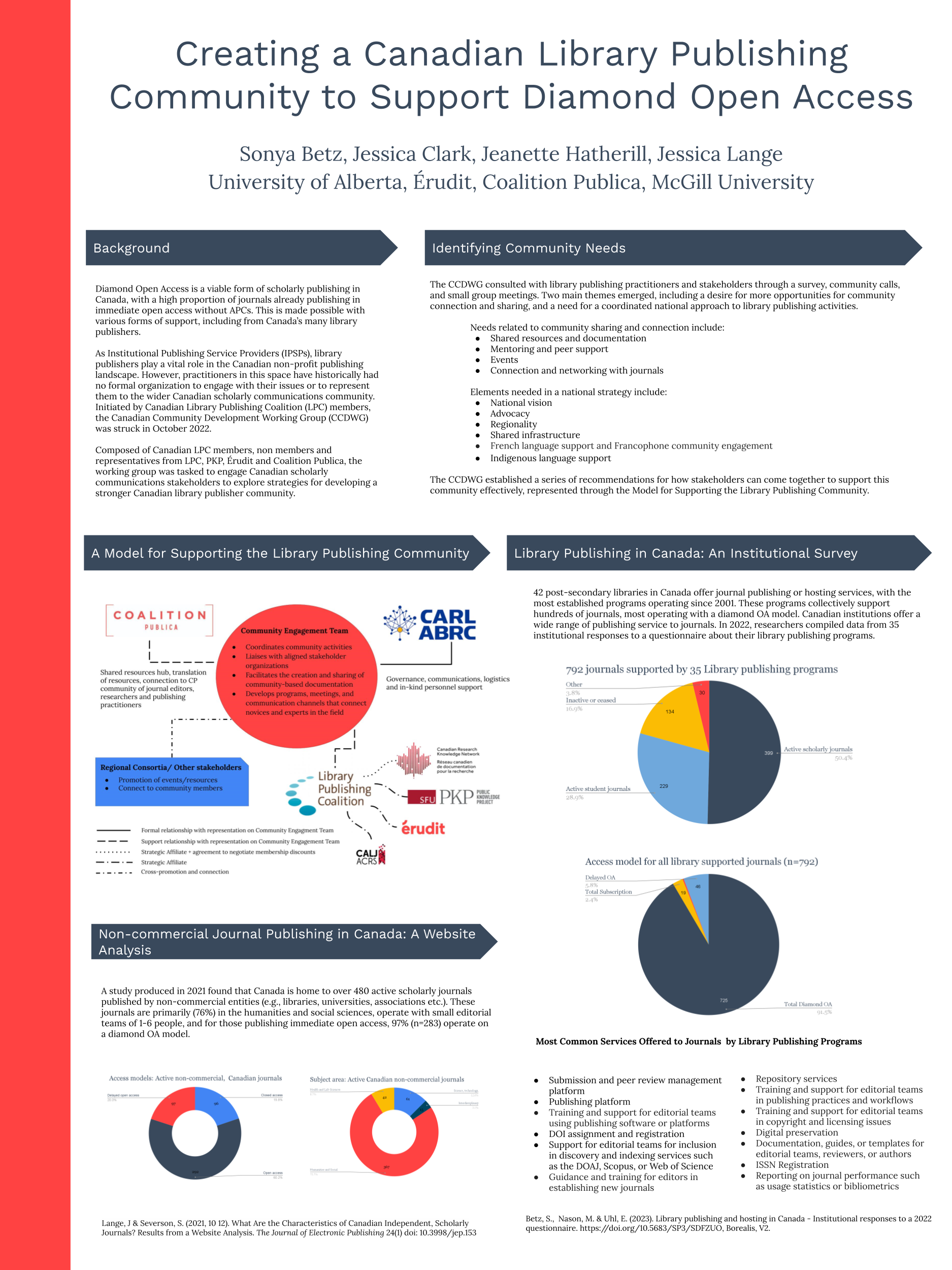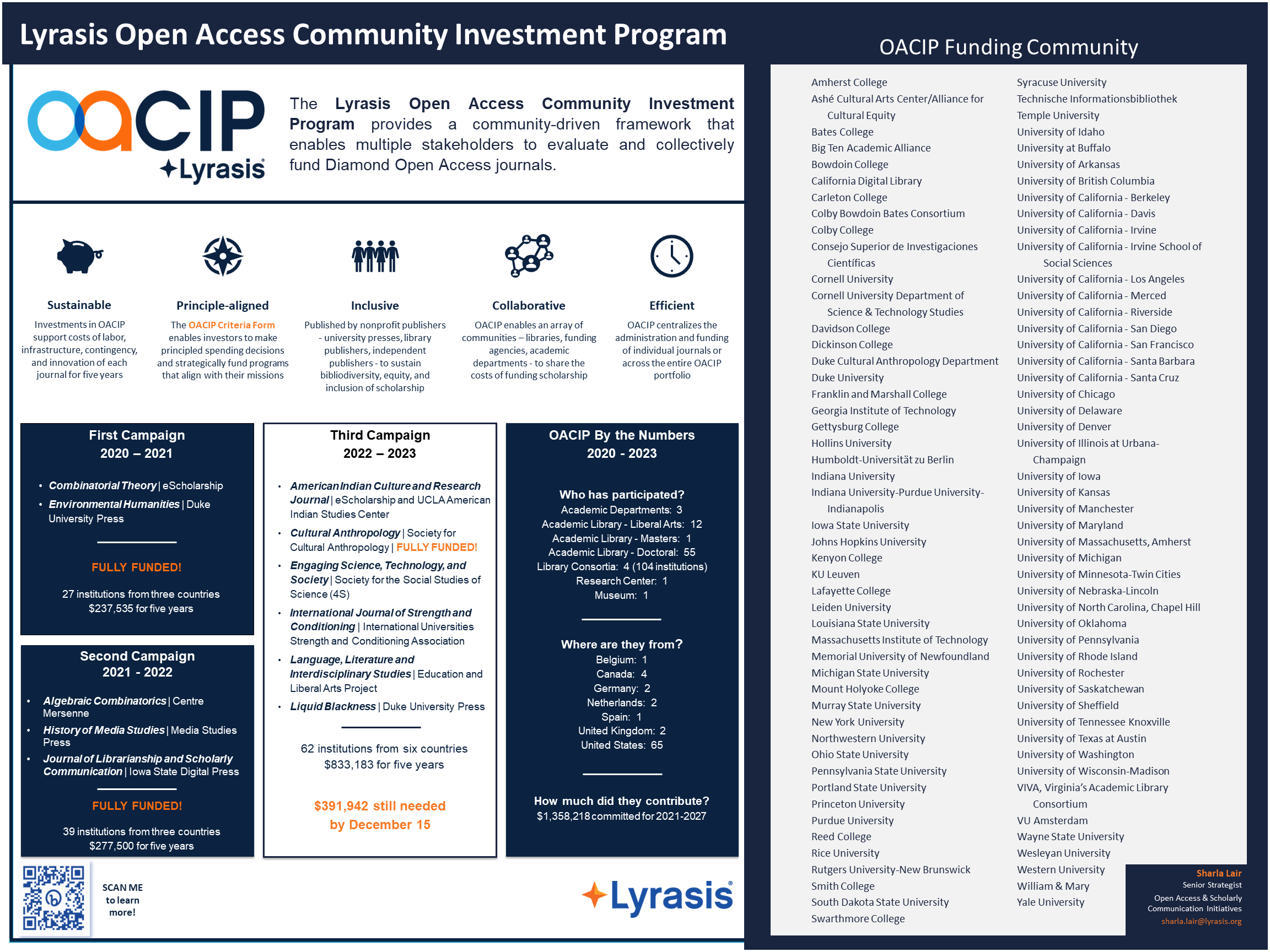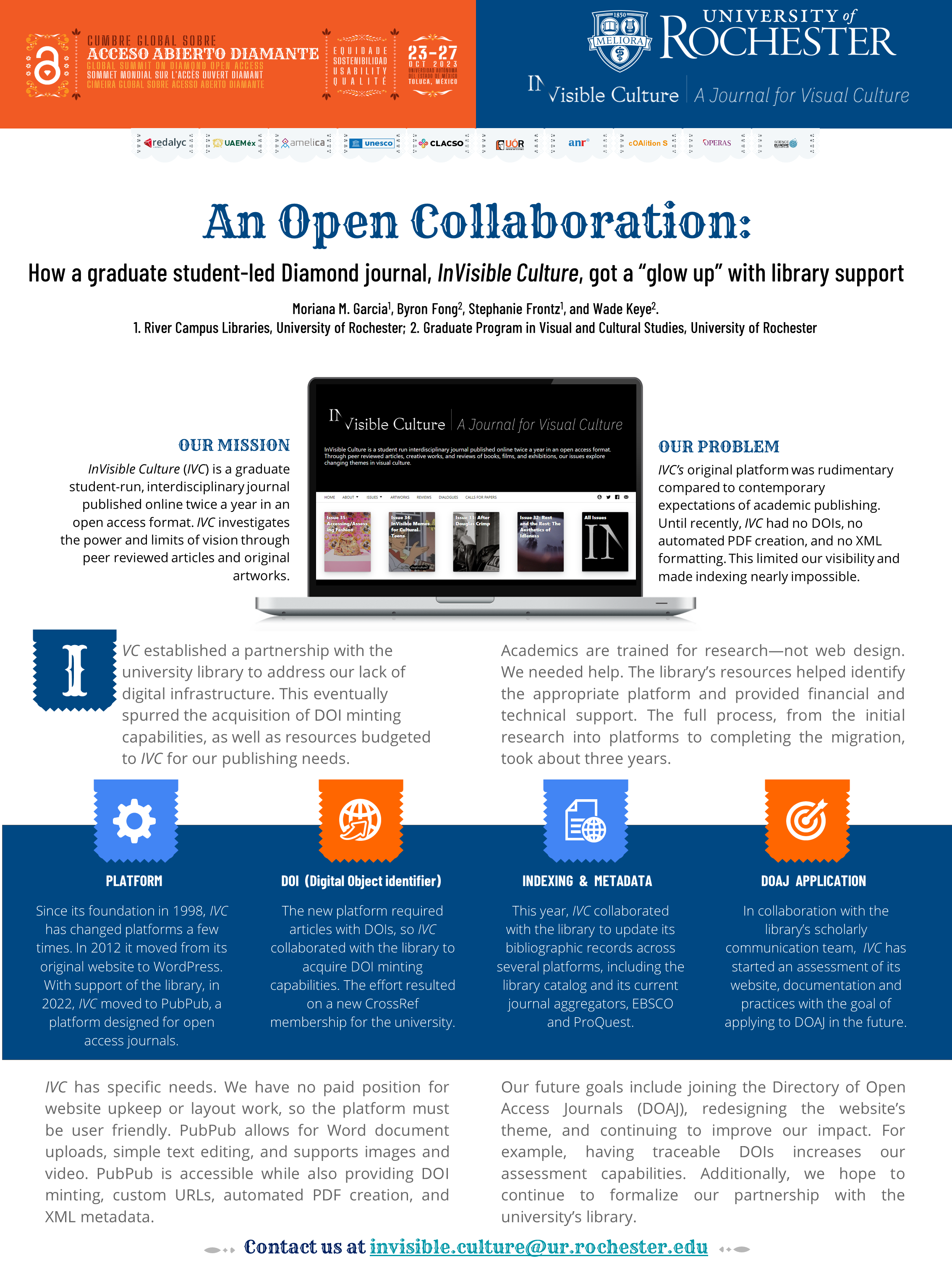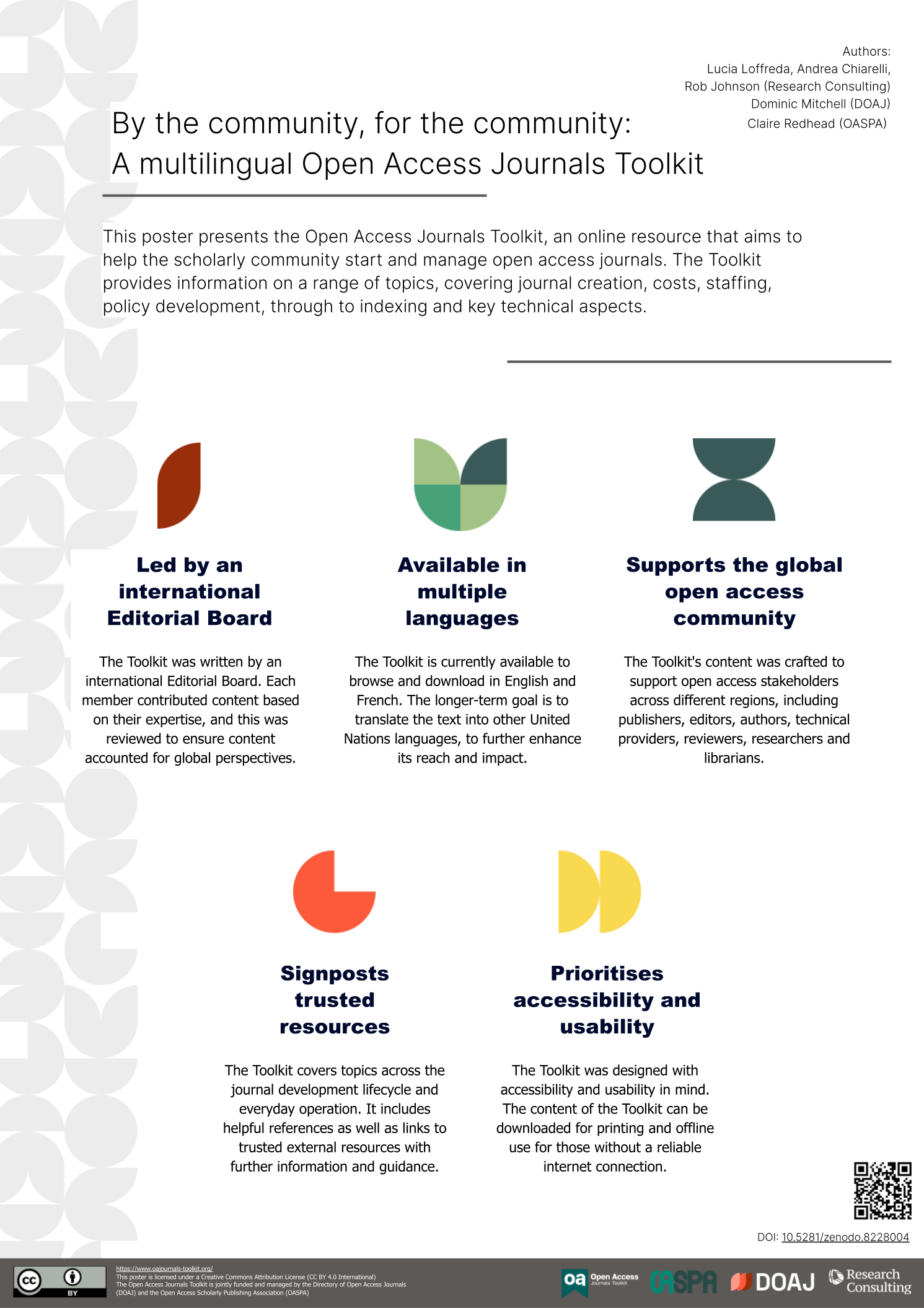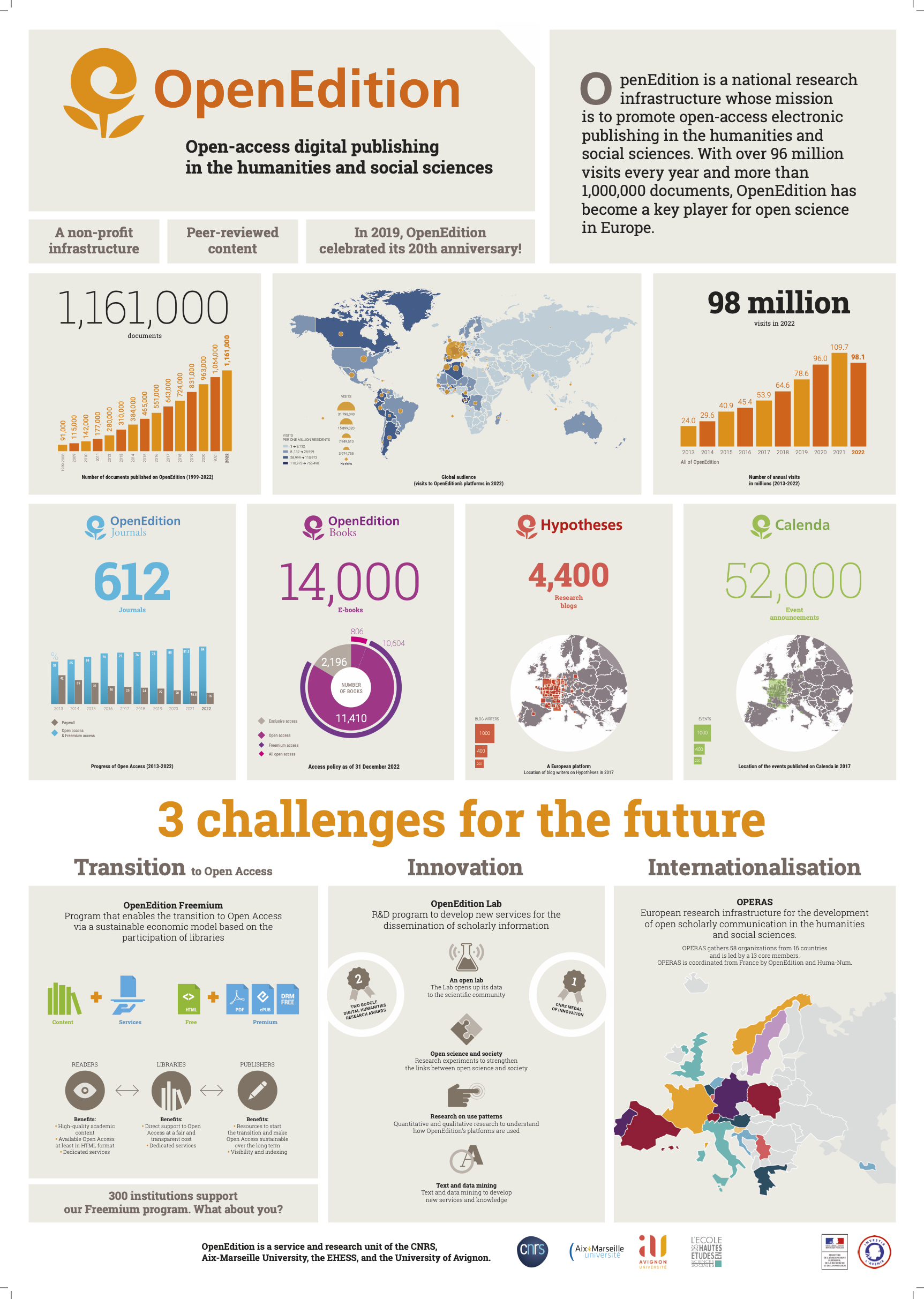Concept & Programme | Posters
CUMBRE GLOBAL SOBRE ACCESO ABIERTO DIAMANTE | GLOBAL SUMMIT ON DIAMOND OPEN ACCESS
SOMMET MONDIAL SUR L ́ACCÈS OUVERT DIAMANT | CIMEIRA GLOBAL SOBRE ACESSO ABERTO DIAMANTE
EQUIDADE | SOSTENIBILIDAD | USABILITY | QUALITÉ
Posters
These are the posters presented during the poster session for the endorsers of the Action Plan for Diamond Open Access.
Centre Mersenne, Services for Open Access Scientific Publishing
Presented by: Célia Vaudaine, Murielle Serlet
Université Grenoble Alpes, Centre national de la recherche scientifique (CNRS)
The Centre Mersenne for Open Scientific Publishing is a not-for-profit, academic-led, full-featured publishing infrastructure for Diamond open access scientific publications prepared in LaTeX.
Launched in January 2018 by researchers and supported by public institutions (CNRS and Université Grenoble Alpes), the centre Mersenne offers an open access dissemination and publication platform as well as affordable editorial and technical services to help editorial teams manage their publication: online publishing, visibility, interoperability and archiving, support to editorial process, typesetting and copyediting…
We are also constantly developing new features for our journal websites to improve the visibility of research results such as semi-automatic translation of scientific articles to allow researchers to write/read in their native language, the possibility to comment articles or to create virtual issues after publication…
Horizon Europe Projects: CRAFT-OA, DIAMAS, and PALOMERA
Presented by: Pierre Mounier, Johan Rooryck
OPERAS/OpenEdition, cOAlition S
With over 40 organisations across Europe participating in three Horizon Europe-funded projects, CRAFT-OA, DIAMAS and PALOMERA, important work is being done towards an equitable future for scholarly communication, with academic communities at the centre.
CRAFT-OA is empowering regional journal platforms and publishing service providers to upscale, professionalise, and reach stronger interoperability with other scientific information systems, by providing services and tools.
The DIAMAS project is developing common standards, guidelines and practices to build capacity for the Diamond publishing sector. Formulating recommendations of this kind aims to create a more sustainable future for Open Access Diamond Publishing in Europe.
PALOMERA has set out to provide actionable recommendations and concrete resources to support and coordinate aligned funder and institutional policies for Open Access books. Doing so involves assessing challenges and bottlenecks that currently slow the widespread implementation of Open Access book policy.
Edinburgh Diamond
Presented by: Rebecca Wojturska
University of Edinburgh
Library publishing is a growing area in the UK, with more and more institutions seeking ways to disrupt traditional publishing and support their staff and students through the power of Open Access. With new developing policies around Open Access, and with relatively high articles and book processing charges from publishers, it is more important than ever for libraries to engage with open access publishing to provide support for their academics and students. It is even more important to be transparent and open about the process, so that we can foster an open community between libraries, publishers, academics and researchers globally.
Edinburgh Diamond – a service based within Edinburgh University Library – supports Diamond Open Access publishing activities. The service is free of charge to Edinburgh staff and students and allows them to publish journals and books with full library support in the areas of hosting (via open source software OJS & OMP), technical support, indexing, policy development, best-practice guidance and workflow training.
Riviste Unimi
Presented by: Rossella Filadoro, Paola Galimberti
University of Milan
Starting from 2008, the University of Milan has invested with conviction in a public and open infrastructure managed by disciplinary communities. Today, there are 61 published journals, making the Milan platform one of the largest in Europe, with over 1 million downloads per year. Since 2020, it has become part of Milano University Press, a diamond open access publishing house. The platform hosts journal in different fields: literature, veterinary sciences, earth sciences, sociology, law.
This poster describes the organizational model of the platform (centralized technical support and autonomous editorial boards), focusing in particular on support for quality processes: training for editorial boards, recommendations for adopting best practices, indexing, monitoring, and regular assessments both in plenary sessions and through individual meetings.
COAR Notify: Bridging the green/gold gap to significantly scale up diamond OA
Presented by: Kathleen Shearer, Eloy Rodrigues
COAR, COAR Notify Initiative
It is a difficult task to compete with legacy commercial publishers at their own game. For years, they have been investing in developing publishing systems, workflows and infrastructures, not to mention the millions of dollars they put towards marketing. However, one of the advantages that community and institution-based initiatives have over the large commercial publishers is that we can collaborate. While it is not in the interest of publishers to work with services that they do not own or control, our communities (with our highly decentralized infrastructures) can and should interconnect, distributing our costs, building sustainability, and adding value to our various services.
The COAR Notify Initiative is developing and accelerating community adoption of a standard approach to linking research outputs in repositories with peer reviews and endorsements in other services. COAR Notify was launched in 2021, and in 2022, was awarded a significant grant from Arcadia, much of which is being devoted to supporting technical implementation in services and platforms. Development work is well underway by several groups. To ensure the COAR Notify functionality is widely available and can benefit our community widely, COAR has also been working with several open source platforms – Dataverse, DSpace, Invenio, Kotahi, and OJS – to support the implementation of COAR Notify technology into their standard codebase. The Arcadia-funded aspect of the project goes until summer 2026, and by then we anticipate a significant user community to be using the protocol.
DIGITAL.CSIC–Psicológica collaboration
Presented by: Isabel Bernal, Pandelis Perakakis
Spanish National Research Council (CSIC), Complutense University
An ongoing collaboration between the institutional repository of the Spanish National Research Council, DIGITAL.CSIC, and the Spanish Society of Experimental Psychology (SEPEX), proves that institutional repositories are valid and effective publishing platforms.
Psicológica is a SEPEX diamond open-access journal that transitioned from a commercial publisher to being exclusively published on DIGITAL.CSIC in 2022 (https://digital.csic.es/handle/10261/228593). In just over one year of collaboration, Psicológica has published around 60 new articles, including preprints and open peer reviews.
With an estimated current cost of approximately €30 per publication, economies of scale make it possible to significantly increase future publication output without incurring substantial additional costs. Our collaboration aligns with several ongoing initiatives to promote Diamond Open Access and can be a useful example for others scholarly societies and repositories considering this path.
Episciences
Presented by: Raphaël Tournoy
Centre pour la Communication Scientifique Directe (CCSD)
Episciences is a complete platform for editing and publishing scientific overlay journals covering all disciplines. Overlay journals are scientific journals whose published content is hosted on open repositories. We currently support arXiv, HAL, Zenodo and are testing the integration with new preprint servers such as bioRxiv, medRxiv, Software Heritage for software codes, and Dataverse powered data repositories. Thus Episciences allows journals to peer review and publish articles, datasets, softwares.
Created in 2013, Episciences has been publishing articles following the diamond open access model since the beginning.
The ambition of our platform is to provide the scientific communities with the technical means to produce high quality journals, at an efficient cost. Our publishing system, available as an open source software, has been designed to facilitate the work of researchers and make them autonomous in their work, throughout the publication process.
We provide free hosting, editorial advice and support for titles accepted onto the platform. To be hosted on Episciences, journal titles need to undergo a scientific evaluation by dedicated academic committees.
Collaboration for Sustainable Open Access Publishing in Africa
Presented by: Iryna Kuchma, Susan Murray, Omo Oaiya, and Milica Ševkušić
AJOL, EIFL, WACREN
Diamond Open Access publishing is on the rise in Africa. Supported by African institutions and facilitated by continental publishing platforms, e.g. African Journals Online (AJOL), it is now discussed in the context of institutional and national open science policy developments aligned with the UNESCO Recommendation on Open Science.
However, the sustainability and quality of journals relying on volunteer work and in-house institutional support are at stake due to constant pressure of looking for funding to cover editorial, management, production and dissemination costs. African journals are struggling to reconcile quality requirements and researchers’ wish to publish within reasonably short timelines; provide sufficient compensation, incentives and motivations for editorial work and peer review – e.g. by recognising editorial and review work in research assessment and promotion, and by paying journal editorial staff; solving infrastructure and network issues.
To address these challenges EIFL, AJOL and WACREN, with support from Wellcome, are launching a three-year project in November 2023 to empower African diamond OA community and offer funding and cost-efficient, open, public, shared infrastructures, while maintaining diversity of publishing. The project will tackle sustainability issues by implementing a participatory funding approach with strong African governance, strengthen national and regional collaborations and solicit funding commitments from African institutions and governments in a multi-stakeholder forum framework. Costs and strategies for flipping APC-based journals to diamond OA will also be defined and sustainability models discussed.
We hope that our approach will contribute to global discussions on the diversity of pathways to quality and sustainability in diamond OA publishing.
Upscaling a Diamond OA Publication Service by Standards – the Hamburg Model
Presented by: Isabella Meinecke, Oliver Krüger
Hamburg State and University Library
The Hamburg State and University Library (SUBHH) provides with Hamburg University Press an established Institutional Publishing Service Provider (IPSP) in the Hamburg metropolitan region. Among other open access publication services, Hamburg University Press offers the hosting of Diamond Open Access journals.
The service’s basic idea emerged from the Hamburg Open Science Framework, funded by the Free and Hanseatic City of Hamburg, and the associated project Modern Publishing. The project’s outcome was a professional state-of-the-art hosting service. Now in regular operation, the Diamond Open Access hosting is a standardized scholar-led service. This is based on clear formal and technical standards as well as on policies which derive from international requirements and recommendations (e.g. Plan S, DOAJ, OpenAIRE). In addition, the service is closely linked to the ongoing European projects DIAMAS and CRAFT-OA. The standards apply to the journals as well as to the service as whole.
Researchers are empowered to publish scholar-led and quality-assured articles and journals. As a result we provide a professional hosting service that is sustainable, FAIR, scalable, and resource-efficient. Upscaling services like ours keep pace with the dynamics of the scholarly communication ecosystem and can respond to evolving needs of technology, policies, and especially research.
Creating a Canadian Library Publishing Community to Support Diamond Open Access
Presented by: Sonya Betz, Jessica Clark, Jeanette Hatherill, and Jessica Lange
University of Alberta Libraries, Érudit/Coalition Publica, PKP/Coalition Publica, and McGill University Library
Diamond Open Access is a viable form of scholarly publishing in Canada, with an estimated 56% of Canadian non-commercial journals already publishing in immediate open access without APCs. This is made possible with various forms of support, including from Canada’s many library publishers and Coalition Publica’s national, open infrastructure for digital scholarly publishing.
As Institutional Publishing Service Providers (IPSP), library publishers play a vital role in this landscape with more than 40 Canadian libraries providing publishing or hosting services to over 800 scholarly and student publications. However, practitioners in this space have had no formal organization to engage with their issues or to represent them to the wider Canadian scholarly communications community. This poster will outline efforts by two major stakeholders to support Canadian library publishing.
In October 2022, the Library Publishing Coalition (LPC) struck a Canadian Community Development Working Group (CCDWG). Initiated by Canadian LPC members, the working group was tasked to engage Canadian scholarly communications stakeholders to explore strategies for developing a stronger Canadian library publisher community.
Érudit and the Public Knowledge Project, together as Coalition Publica, are supporting the Canadian social sciences and humanities journal community by developing and coordinating an open and sustainable national infrastructure for digital scholarly publishing. Library publishers are an important part of this national infrastructure.
Lyrasis Open Access Community Investment Program
Presented by: Sharla Lair
Lyrasis
Despite diamond open access’s (OA) promise to provide a more equitable and diverse foundation for scholarly publishing, diamond OA journals experience challenges related to technical capacity, management, visibility, and sustainability, primarily because they exist outside of the traditional funding channels or are not represented by well-funded disciplines.
The Lyrasis Open Access Community Investment Program (OACIP) is trying to change this for diamond OA journals published by university presses, library publishers, and smaller independent publishers, such as societies or scholarled initiatives. OACIP provides a community-driven framework that enables multiple stakeholders to evaluate and collectively fund diamond OA journals.
This demonstrates how multiple stakeholders can collectively strengthen the diamond OA ecosystem through a coordinated financial mechanism, an action called for in the Diamond Open Access Action Plan.
An Open Collaboration: graduate student-led Diamond journal, InVisible Culture, gets a “glow up” with library support
Presented by: Moriana M. Garcia, Byron Fong, Stephanie Frontz, and Wade Keye
BF and WK, Graduate Program in Visual and Cultural Studies, University of Rochester; MG and SF, River Campus Libraries, University of Rochester
InVisible Culture (IVC) is an early, well-established, Diamon Open Access, online-only journal in the humanities, founded and run by graduate students.
InVisible Culture’s original platform was rudimentary compared to contemporary expectations of academic publishing. Until recently, IVC had no DOIs, no automated PDF creation, and no XML formatting. This decreased our visibility and made indexing nearly impossible.
With virtually no budget or attachment to a press, it was left entirely to us to address these shortcomings. As scholars not necessarily familiar with the technical side of academic publishing, our own lack of expertise has been the main obstacle to this project. To rectify this, the journal fostered a relationship with the university library, eventually finding dedicated support from within its ranks. This formal relationship between the journal and the library eventually spurred the acquisition of DOI minting capabilities by the university, as well as resources budgeted specifically to IVC and other local publishing efforts.
Now, under new leadership, the library has committed further by creating a unit dedicated to support scholarly communication. After three years of work, we have now migrated to an open, community-led platform that easily accommodates our needs (PubPub) with our entire backlog registered with DOIs. Our next goal is to apply to the Directory of Open Access Journals. The authors hope to share their experiences with other graduate-student-run journals, and further discuss tactics for finding support and visibility for their work.
Open Access Journals Toolkit
Presented by: Joanna Ball
Directory of Open Access Journals (DOAJ)
The Open Access Scholarly Publishing Association (OASPA) and DOAJ (Directory of Open Access Journals) have released a new Open Access Journals Toolkit to promote transparency, accessibility, and inclusivity in scholarly publishing. The Toolkit answers a need for an online resource to support new and established open access journals in navigating the rapidly changing landscape of open access publishing.
Intended for anyone involved in journal publishing and with a strong focus on helping under-resourced journals globally, the Toolkit enables empowered and informed decision-making. It will contribute to the advancement of scholarly publishing standards and best practices, and will be particularly useful for Diamond journals. It is a collaborative project developed with input from a diverse editorial board. Key features include:
- A user-friendly and accessible website with easy navigation and search functionality, adhering to W3C accessibility guidelines, making it simple for all users to find relevant information and resources, regardless of how they access the Internet.
- A curated collection of resources covering various aspects of open access publishing, such as editorial policies, licensing, metadata and indexing.
- Practical guidelines and templates to help publishers establish and maintain high-quality open access journals.
- A downloadable version to support those whose connections may not allow consistent browsing of the web version.
- Availability in several languages (French already available)
OpenEdition
Presented by: Pierre Mounier
Open Edition/OPERAS
OpenEdition is a national research infrastructure whose mission is to promote open-access electronic publishing in the humanities and social sciences. With over 96 million visits every year and more than 1,000,000 documents, OpenEdition has become a key player for open science in Europe.
Entradas recientes
Comentarios recientes
This site uses cookies. Find out more about cookies and how you can refuse them.




